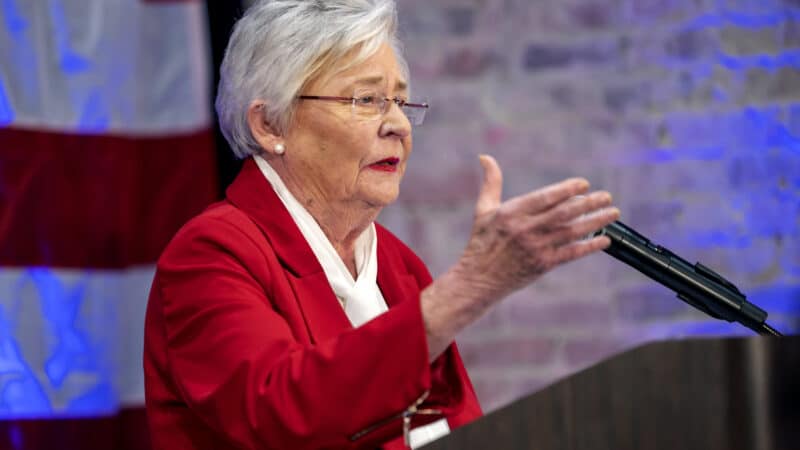Gov. Kay Ivey wants to give the state more time to carry out executions
Gov. Kay Ivey denies that prison officials or law enforcement are to blame for the problems carrying out executions, saying instead that "legal tactics and criminals hijacking the system are at play here."
MONTGOMERY, Ala. (AP) — Alabama Gov. Kay Ivey on Monday said she wants to give the state additional time to carry out an execution after a series of failed lethal injections.
The Republican governor sent a letter to the Alabama Supreme Court asking justices to alter a longstanding rule that limits execution warrants to a single date. It is the first change requested by Ivey after announcing a “top-to-bottom” review of execution procedures. The review is ongoing, Ivey spokeswoman Gina Maiola said Monday.
Alabama prison officials called off two recent scheduled lethal injections — for Kenneth Eugene Smith in November and Alan Miller in September — as a midnight deadline approached after last-minute legal appeals and difficulties by the execution team in connecting an IV line to each inmate.
Under Ivey’s proposal, the state corrections commissioner could immediately designate a new execution date if a last-minute stay or some other delay prevents the state from carrying out an execution on the original date listed on the death warrant. She said the federal government and the state of Kentucky have similar rules. Currently, if Alabama authorities can’t get the procedure underway by midnight, officials must ask the Alabama Supreme Court to set a new execution date.
“In several recent executions, last-minute gamesmanship by death row inmates and their lawyers has consumed a lot of valuable time, preventing the department from carrying out its execution protocol between the conclusion of all legal challenges in the federal courts and the expiration at the death warrant issued by your court,” Ivey wrote.
An alternative, Ivey wrote, would be for the court to allow a longer period for the execution to be carried out. California gives a 10-day window and Georgia allows seven days, the governor’s office wrote.
While Ivey blamed Alabama’s failed lethal injections on the single-day time frame and last-minute appeals, lawyers for inmates and advocacy groups have said the repeated difficulties show something is wrong with Alabama’s procedures.
“One of the Alabama Department of Corrections’ clear problems in carrying out executions has been the inability of the execution team to establish IV executions lines.” Robert Dunham, executive director of the Death Penalty Information Center wrote in an email.
Extending how long the state has to to carry out an execution certainly increases the probability that the execution team will eventually find a vein or perform an invasive procedure to set an IV line, he said, but “unfortunately, it doesn’t do anything to improve the performance of ADOC execution personnel to ensure that future executions are not also botched.”
In a court filing opposing the setting of a new execution date for Smith, his lawyers wrote that his treatment “does not fall within society’s standards for a constitutional execution. The botched execution was terrifying and extremely painful for Mr. Smith.”
Ivey last month requested a pause in executions after the state called off Smith’s lethal injection. It was the second time this year and the third time since 2018 that the state was unable to put an inmate to death. The state completed an execution in July, but only after a three-hour delay caused at least partly by trouble starting an IV line on Joe Nathan James Jr.
Ivey said the state is also looking at moving up the current 6 p.m. start time for executions to give the Department of Corrections more time. Corrections Commissioner John Hamm will make a recommendation to her for a new time, she told justices.
Hamm last month said “everything is on the table” in the review, including how the department trains staff and prepares for executions. Ivey said she agrees because she wants to make sure future executions go forward “to ensure those guilty of perpetrating the most heinous crimes in our society receive their just punishment.”
40 years after ‘Purple Rain,’ Prince’s band remembers how the movie came together
Before social media, the film Purple Rain gave audiences a peak into Prince’s musical life. Band members say the true genesis of the title song was much less combative than the version presented in the film.
Park Fire in California could continue growing exponentially, Cal Fire officer says
Cal Fire has confirmed that over a hundred structures have been damaged in the Park Fire, which grew overnight near Chico, Calif. Difficult firefighting conditions are forecast through Friday night.
Checking in with Black voters in Georgia about the election, now that Biden is out
Some voters who could be key to deciding who wins Georgia. What do they think about Vice President Harris becoming the frontrunner in the race to be the Democratic nominee?
Tahiti’s waves are a matter of ‘life and death’ for surfing Olympics
Tahiti's Teahupo'o wave has a slew of riders for the Paris 2024 Olympics. NPR finds out why it's called one of the most dangerous waves.
Researchers are revising botanical names to address troubling connotations
Since the mid-1700s, researchers have classified life with scientific names. But some of them have problematic histories and connotations. The botanical community is trying to tackle this issue.
A spectacular opening ceremony wowed a global audience despite Paris’ on-and-off rain
The Paris Olympics opening ceremony wowed Parisians, fans and most everyone who was able to catch a glimpse of thousands of athletes floating down the Seine to officially begin the Games.



